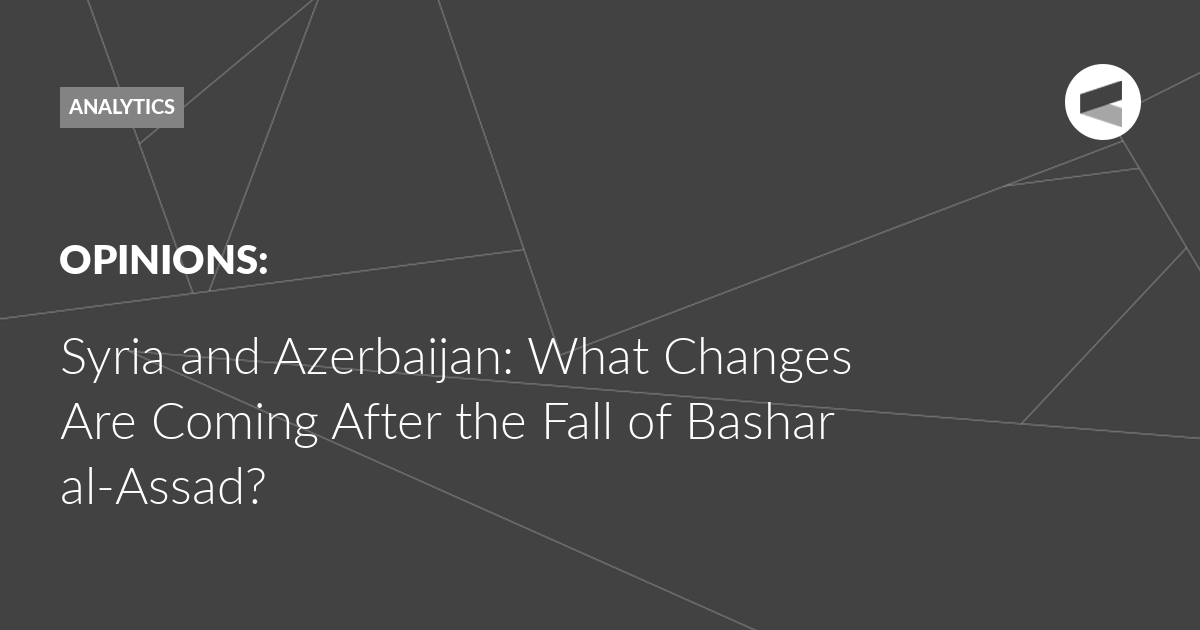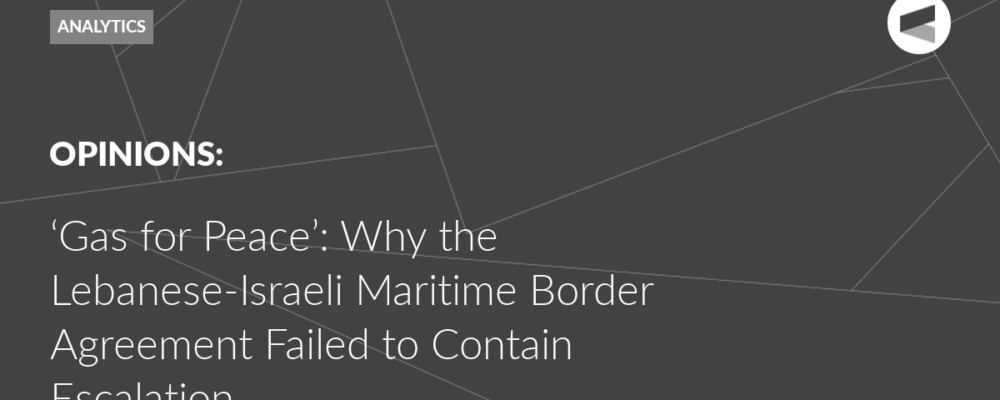The Republic of Azerbaijan, along with its close ally, Turkey, is trying to define new relations with the new leaders of Syria. The important and long-term consequence of this development will be greater alignment between Syria, Turkey and the Republic of Azerbaijan in the South Caucasus, Vali Kaleji
writes.
The gradual development of relations between Syria and the Republic of Azerbaijan
On January 16, 1992, the Syrian Arab Republic recognised the independence of the Azerbaijani state, and diplomatic relations between the two countries were established on March 28, 1992. In spite of close ties between Syria and Armenia during the First Karabakh War (1988-1994), Baku and Damascus tried to develop bilateral relations without being influenced by the “third factor.” Although the development process of relations between Baku and Damascus didn’t proceed to the extent of relations between Yerevan and Damascus, the Republic of Azerbaijan opened an embassy in Damascus in May 2008.
On July 9, 2009, the president of the Syrian Arab Republic, Bashar al-Assad, made his first official visit to Azerbaijan. The parties agreed to supply between 1 and 1.5 billion cubic meters of Azerbaijani gas to Syria. During the visit, a joint Azerbaijani-Syrian business forum was held. On November 23, 2010, the parties reached an agreement on the technical particulars of the 20-year purchase of natural gas. In December 2011, Azerbaijan commenced natural gas exports to Syria via Turkey and Georgia.
Towards the reduction of relations after the Syrian Civil War
However, following the start of the Syrian civil war on March 15, 2011, relations between the Republic of Azerbaijan and Syria gradually became complicated. Baku stated that as a small power in the context of the modern international system, Azerbaijan tries not to get directly involved in the Syrian conflict. However, it affected the Republic of Azerbaijan in different respects. First, from a religious point of view, unlike Christian Armenia, the Republic of Azerbaijan is an Islamic country. Therefore, the civil war in Syria and the emergence of various terrorist groups such as ISIS and the al-Nusra Front
, with their radical religious ideas, could affect the society of Azerbaijan despite its geographical distance from Syria as well as the different structure and religious composition of Syria and the Republic of Azerbaijan. There were varying estimates of how many Azerbaijani citizens took up arms for the “Caliphate”, ranging from 400 to 1,000. The number of Azeri fighters in the Syrian civil war was not significant; however, Salafist ideas could threaten the secular political structure of the country.
Second, from a political point of view, since the beginning of the Arab Spring revolutions, Baku has been in a state of political limbo. For instance, the statue of former Egyptian president Hosni Mubarak was removed from the suburbs of Baku and replaced with a more neutral monument. However, despite close and strategic relations with Turkey, Baku could not possibly have openly supported the Syrian opposition and government change in Damascus. On the other hand, Baku did not want to support the government of Bashar al-Assad, a close ally of Armenia, Russia, and Iran. This duality caused the formation of a cautious approach on the part of the Republic of Azerbaijan to the Syrian crisis. As a result, although Azerbaijan had to back the Arab League’s decision to suspend Syria as a non-permanent UN Council member in October 2011, it had proven even more cautious. Indeed, the Azerbaijani government, which had previously remained silent on the Syrian crisis, viewed the brutally violent stalemate as a positive development. The leadership believed that the brutal and chaotic sectarian violence that followed the uprising against Assad discredited any push for government change in Baku, a fate the country wishes to avoid. As a result of the Syrian civil war, as mentioned earlier, the Embassy of the Republic of Azerbaijan in Syria was moved to Beirut.
In addition, on the one hand, Baku accused Syria of cooperating with Armenia in settling Syrian Armenians in Karabakh, while on the other hand, Azerbaijan supported Turkey’s operation in Afrin, Syria, against PKK/KCK/PYD-YPG and ISIS on January 2, 2018. The differences between Baku and Damascus entered a new stage during the Second Karabakh War (September 27 – November 10, 2020). While Armenia and Syria accused Turkey and Azerbaijan of sending Syrian Salafist fighters to the front in Karabakh, Baku and Ankara accused Syria and Armenia of facilitating the Armenian Secret Army for the Liberation of Armenia (ASALA), People’s Protection Units (YPG), and the Kurdistan Workers’ Party (PKK) in the region. The consequence of these developments was a sharp decline in the level of relations between Damascus and Baku.
Fall of the Bashar al-Assad government: What changes are coming?
But it seems that after the sudden fall of the Bashar al-Assad government on December 8, 2024, these conditions are gradually changing and many foreign policy approaches are being revised. In a very important development, a senior Ukrainian delegation led by Foreign Minister Andrii Sybiha met with Syria’s de facto leader and head of the Hayat Tahrir al-Sham (HTS), Abu Mohammed al-Jolani (Ahmed Hussein al-Shara) in Damascus on December 30, 2012. Indeed, Azerbaijan’s Deputy Foreign Minister Yalchin Rafiyev met with Syria’s new Foreign Minister Asaad al-Shaibani during a recent visit to Syria on December 29, 2024. Azerbaijan then reopened its embassy in Damascus, Syria’s capital, after a 13-year hiatus on February 18, 2025. Indeed, he emphasised that Azerbaijan, alongside Turkey, stands in solidarity with Syria during this crucial period aimed at ensuring the country’s stability and the welfare of its people. Rafiyev further assured that Azerbaijan would provide all necessary support during Syria’s reconstruction process.
These statements indicate that the Republic of Azerbaijan intends to play a more important role in post-Assad Syria alongside its traditional ally, Turkey. It seems that Turkey’s close relations with the new leaders of Syria, as well as the absence and weakening of Armenia in Syria after Assad, have provided a good opportunity for Baku. In addition, the Republic of Azerbaijan can participate with Turkey in the process of reconstructing Syria, which will increase the economic and commercial influence of Azeri public and private companies there in the wake of Assad’s departure.
Another noteworthy point is the similarity between the fall of Bashar al-Assad’s government to the opposition in Syria and the recapture of Nagorno-Karabakh by the Republic of Azerbaijan. In this regard, Azerbaijan’s Deputy Foreign Minister Yalchin Rafiyev in meeting with Syria’s new Foreign Minister Asaad al-Shaibani highlighted that “Azerbaijan’s experience in rebuilding and revitalising its liberated territories could be applied to Syria’s recovery efforts, referring to Karabakh, a South Caucasus territory liberated in 2020-2023 from a nearly 30-year occupation.” Indeed, Shaibani emphasised that “Azerbaijan’s liberation of its territories from occupation was crucial for promoting global peace and stability, and extended his congratulations to the Azerbaijani people.”
While under the leadership of Bashar al-Assad at the peak of tensions with Ankara, Syria was trying to simulate Turkey’s approach in supporting the Syrian opposition with the massacre of Armenians. For example, then-deputy Prime Minister and Foreign Minister of Syria, Walid al-Moallem in a joint press conference with Eduard Nalbandian, the former Minister of Foreign Affairs of Armenia, said in Damascus on May 27, 2015, “If the international community had imposed the necessary punishment on the butchers who committed the Armenian genocide in the early 20th century, their descendants in Turkey today would not have dared to commit atrocities through their pawns in Syria.” Therefore, it was not surprising that Syria was the second Arab country after Lebanon to recognise the massacre of Armenians as genocide on February 13, 2020.
In the last important development, on February 14, 2025, Azerbaijan’s President Ilham Aliyev congratulated Ahmad al-Sharaa [Abu Mohammad al-Julani] on assuming the office of the President of the Syrian Arab Republic for the transitional period. In this message, he said that “’Today, there are great opportunities for elevating relations between Azerbaijan and Syria to a qualitatively new level and enriching our cooperation with new content. In this regard, I avail myself of this opportunity to invite you to visit Azerbaijan,” It seems that we can expect the new Syrian leader to visit Baku in the near future, following the official visit he had to Saudi Arabia and Turkey.
Therefore, the current positions of Syria’s new leaders contrast completely with its positions under the leadership of Bashar al-Assad regarding aligning with and supporting Armenians and Armenia. This indicates that since the fall of Bashar Assad, a significant change has been made in Syria’s approach towards both the Republic of Azerbaijan and Armenia. The important and long-term consequence of this development will be greater alignment between Syria, Turkey and the Republic of Azerbaijan in the South Caucasus.
The Valdai Discussion Club was established in 2004. It is named after Lake Valdai, which is located close to Veliky Novgorod, where the Club’s first meeting took place.
Please visit the firm link to site






